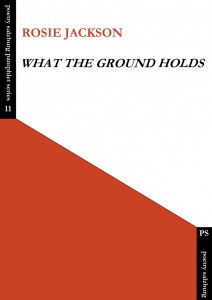Rosie Jackson’s What the Ground Holds celebrates what endures in the lives of individuals, and in the human and natural world. Demeter and Persephone are among the guiding mythic figures, more earthy writers and artists giving flesh to the same stories. In ‘Recovery Stroke,’ the final lines capture the recurring and moving theme: “the greatest beauty sometimes/happens at the weakest point”.
The structuring idea is acted out in the first few poems. In ‘Persephone,’ the daughter of Demeter escapes from the underworld, eating the pomegranate seeds that will keep her prisoner forever. In ‘Persephone Blames the Dress’ Persephone shows her mother sewing the dress “too tight over my eyes/till I was falling”, before ‘Demeter Takes Up Embroidery’ has her mother finally deciding “I am done with all those seeds which breed loss.” This is implicitly both a feminist and a Freudian story.
Jackson then turns to the reality of her own family, her father taking her down a coalmine that mimics the mythic underworld, while at home “Mum cooks Sunday roast”. We are in the world of actual families here, the world of parents and children, lovers and the bereaved. ‘My Mother’s Engagement Ring’ is one of Jackson’s most powerful poems, the daughter scrubbing the ring she has inherited, “prodding out the years // of standing at the sink”, thinking “of all the things she touched/those last forty years // and all the things – /a man, a child, a glass of wine – /she didn’t”. The abrupt final line makes the truth behind the mourning painfully real.
There is a restrained anguish throughout What the Ground Holds. Lovers in ‘The Lovers’ Exchange’ find each other’s stories in the scars experience has left on their bodies. A friend dies in ‘What the Ground Holds’, “In the time it takes me to type her poem,/the room cleared/like one of Prospero’s tricks.” In ‘Dropped from Life,’ another friend commits suicide, and Jackson imagines the souls of the dead wandering the world, longing to be back in life, “where friends and lovers have forgotten/what they promised/about always loving,/always holding hands”.
Five poems based on paintings by Stanley Spencer complete the story. Spencer himself speaks in ‘Of Angels and Dirt,’ telling us “I am on the side of the angels and dirt.” The next three poems are in Hilda’s voice, ‘Hilda Carline Spencer’ showing the couple “Linked by our sorrow”, then in ‘Seated Nude’ Hilda reflecting bitterly of her own nudity “There is no lust,/none of the meaty pleasure/that reddens his portraits of Patricia.” In ‘Hilda, Unity, and Dolls’ Hilda is confined to a mental asylum, thinking of her daughter Unity, the name that “didn’t work./We still split up./I split up.” In the final poem, ‘Resurrection,’ all the “lovers, mothers, children, fathers, plumped-up wives” are brought together in the fleshy colours of Spencer’s paintings, the only afterlife they will know. A fine sequence to end this marvellous collection.
Order your copy of Rosie Jackson’s What the Ground Holds (Poetry Salzburg, 2014), pp.40, priced at £6 here

